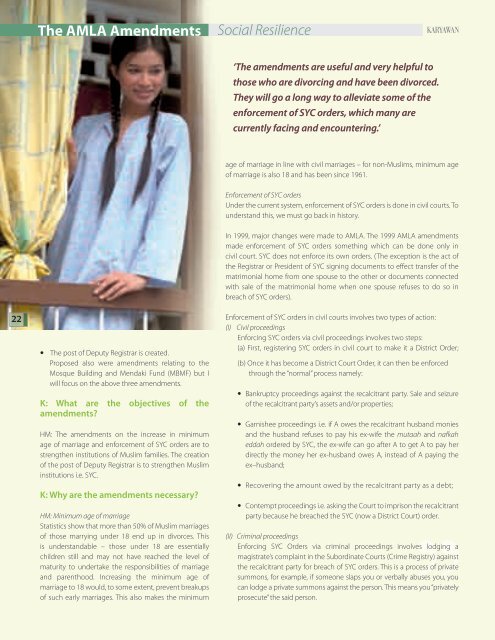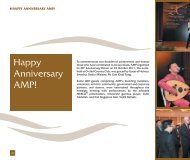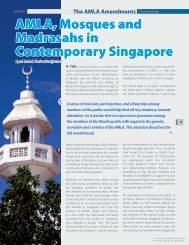The AMLA Amendments - Association of Muslim Professionals
The AMLA Amendments - Association of Muslim Professionals
The AMLA Amendments - Association of Muslim Professionals
You also want an ePaper? Increase the reach of your titles
YUMPU automatically turns print PDFs into web optimized ePapers that Google loves.
<strong>The</strong> <strong>AMLA</strong> <strong>Amendments</strong><br />
Social Resilience<br />
KARYAWAN<br />
‘<strong>The</strong> amendments are useful and very helpful to<br />
those who are divorcing and have been divorced.<br />
<strong>The</strong>y will go a long way to alleviate some <strong>of</strong> the<br />
enforcement <strong>of</strong> SYC orders, which many are<br />
currently facing and encountering.’<br />
age <strong>of</strong> marriage in line with civil marriages – for non-<strong>Muslim</strong>s, minimum age<br />
<strong>of</strong> marriage is also 18 and has been since 1961.<br />
Enforcement <strong>of</strong> SYC orders<br />
Under the current system, enforcement <strong>of</strong> SYC orders is done in civil courts. To<br />
understand this, we must go back in history.<br />
22<br />
• <strong>The</strong> post <strong>of</strong> Deputy Registrar is created.<br />
Proposed also were amendments relating to the<br />
Mosque Building and Mendaki Fund (MBMF) but I<br />
will focus on the above three amendments.<br />
K: What are the objectives <strong>of</strong> the<br />
amendments<br />
HM: <strong>The</strong> amendments on the increase in minimum<br />
age <strong>of</strong> marriage and enforcement <strong>of</strong> SYC orders are to<br />
strengthen institutions <strong>of</strong> <strong>Muslim</strong> families. <strong>The</strong> creation<br />
<strong>of</strong> the post <strong>of</strong> Deputy Registrar is to strengthen <strong>Muslim</strong><br />
institutions i.e. SYC.<br />
K: Why are the amendments necessary<br />
HM: Minimum age <strong>of</strong> marriage<br />
Statistics show that more than 50% <strong>of</strong> <strong>Muslim</strong> marriages<br />
<strong>of</strong> those marrying under 18 end up in divorces. This<br />
is understandable – those under 18 are essentially<br />
children still and may not have reached the level <strong>of</strong><br />
maturity to undertake the responsibilities <strong>of</strong> marriage<br />
and parenthood. Increasing the minimum age <strong>of</strong><br />
marriage to 18 would, to some extent, prevent breakups<br />
<strong>of</strong> such early marriages. This also makes the minimum<br />
In 1999, major changes were made to <strong>AMLA</strong>. <strong>The</strong> 1999 <strong>AMLA</strong> amendments<br />
made enforcement <strong>of</strong> SYC orders something which can be done only in<br />
civil court. SYC does not enforce its own orders. (<strong>The</strong> exception is the act <strong>of</strong><br />
the Registrar or President <strong>of</strong> SYC signing documents to effect transfer <strong>of</strong> the<br />
matrimonial home from one spouse to the other or documents connected<br />
with sale <strong>of</strong> the matrimonial home when one spouse refuses to do so in<br />
breach <strong>of</strong> SYC orders).<br />
Enforcement <strong>of</strong> SYC orders in civil courts involves two types <strong>of</strong> action:<br />
(I) Civil proceedings<br />
Enforcing SYC orders via civil proceedings involves two steps:<br />
(a) First, registering SYC orders in civil court to make it a District Order;<br />
(b) Once it has become a District Court Order, it can then be enforced<br />
through the “normal” process namely:<br />
• Bankruptcy proceedings against the recalcitrant party. Sale and seizure<br />
<strong>of</strong> the recalcitrant party’s assets and/or properties;<br />
• Garnishee proceedings i.e. if A owes the recalcitrant husband monies<br />
and the husband refuses to pay his ex-wife the mutaah and nafkah<br />
eddah ordered by SYC, the ex-wife can go after A to get A to pay her<br />
directly the money her ex-husband owes A, instead <strong>of</strong> A paying the<br />
ex–husband;<br />
• Recovering the amount owed by the recalcitrant party as a debt;<br />
• Contempt proceedings i.e. asking the Court to imprison the recalcitrant<br />
party because he breached the SYC (now a District Court) order.<br />
(II) Criminal proceedings<br />
Enforcing SYC Orders via criminal proceedings involves lodging a<br />
magistrate’s complaint in the Subordinate Courts (Crime Registry) against<br />
the recalcitrant party for breach <strong>of</strong> SYC orders. This is a process <strong>of</strong> private<br />
summons, for example, if someone slaps you or verbally abuses you, you<br />
can lodge a private summons against the person. This means you “privately<br />
prosecute” the said person.

















